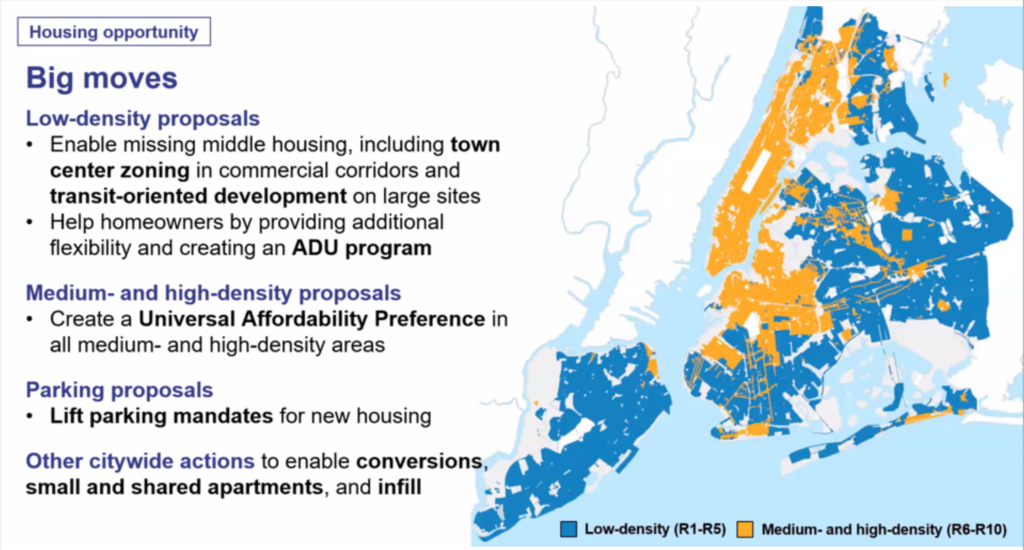By their own admission, Mayor Adams and the Department of City Planning’s proposed City of Yes – Economic Opportunity (COYEO), is a massive deregulatory program. The vast majority of proposals in this package will do serious damage to not only the neighborhoods in Community Board 5 but communities throughout the city. It must be rejected in full.
Here are short responses to each of the 18 proposed actions:
• Lifting time limits for activating storefronts
Legal non-conforming storefront uses that lapse should not be allowed to reopen at will. They should be negotiated on a case-by-case basis. Reject.
• Simplify rules for business types allowed on commercial streets
Changes in allowances of business types will seriously affect local commercial streets in lower-density districts in ways that are not being considered by the proposal. Reject.
• Expand opportunities for small-scale clean production
Allowing industry and production, no matter how clean, in a blanket fashion throughout the city is not appropriate. Reject.
• Modernize loading dock rules so buildings can adapt over time
Instead of allowing this for all loading berths and docks, create new Special District zoning distråicts for certain areas where there are large concentrations of buildings that would be affected. Reject.
• Enable commercial activity on upper floors
Clearly, this proposal would be a nightmare in lower-density neighborhoods. Reject.
• Simplify and modernize the way businesses are classified in zoning
Combining 18 Use Groups into 10 categories opens the door to inappropriate uses neighborhoods throughout the city. For modernization purposes, add new uses to existing Use Groups. Reject.
• Clarify rules to permit indoor agriculture
Based upon the intent of this proposal, allow vertical farming and indoor operations in high density districts only, as they will create major issues in lower-density areas. Reject.
• Give life sciences companies more certainty to grow
This is an absolutely terrible idea. Neighborhood commercial and lower- density districts are absolutely not organized or prepared to accommodate life science types of development and usage as defined in this proposal. Reject.
• Support nightlife with common- sense rules for dancing and live entertainment
Before this proposal is allowed citywide, it would make sense for a pilot program in a specific location for several years to see what the ramifications will actually be. Reject.
• Create more opportunities for amusements to locate
The size, scope and details of amusements in higher density commercial districts (C3-C6) are not described whatsoever in this proposal. Again, adding new uses to the existing framework makes more sense. Reject.
• Enable entrepreneurship with modern rules for home-based businesses
Absolutely not. Increasing allowable uses, square footage and employees in a primary residence is totally unacceptable. Reject.
• Introduce corridor design rules that ensure buildings contribute to surroundings
We need more mandatory streetscape design that caters to our unique neighborhoods, not uniform rules that dumb everything down while pretending they will make for better design standards. Reject.
• Reduce conflicts between auto repair shops and pedestrians
The problem with the conflict is that auto repair uses shouldn’t be allowed in C2 and C6 districts at all – they should be in C8 zones. Reject.
• Encourage safe and sustainable deliveries with micro-distribution
It is our belief that this proposal will set up continuous conflict with other storefront operations on typical commercial strips. Micro-distribution should only be allowed through a Special Permit process with mandatory renewal on a two-year basis in targeted neighborhoods, not in every neighborhood. Reject.
• Facilitate local commercial space on residential campuses
This is an operation to allow large-scale commercial development in NYCHA and other campuses to make market-rate development in those places more attractive. This should be a ULURP action with a commercial overlay process, not CPC authorization. Reject.
• Create process for allowing corner stores in residential areas
If adopted, would change the face of our communities and potentially allow retail and office commercial development on any residential property within 100 feet of a corner up to 2500 square feet in size where it is currently prohibited. While it would need City Planning Commission approval, we believe it will become a routine permitting process that will have extremely negative consequences. Unacceptable on every level. Reject.
• Rationalize waiver process for business adaptation and growth
Allowing expansion and bulk relief for commercial development by BSA and CPC sign offs makes no sense and removes the ability of communities to assess whether those businesses are still appropriate for their locations (done through a typical ULURP action). Reject.
• Create new kinds of zoning districts for future job hubs –
This is a proposal that is specifically designed to be a vehicle to lift the Floor Area Ratio (FAR) cap (currently at a 12 FAR Statewide) to 15 in order to allow for still more density and development that’s at an inappropriate scale. Reject.



